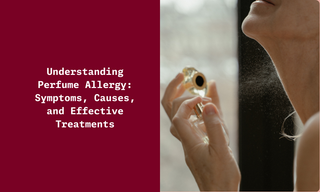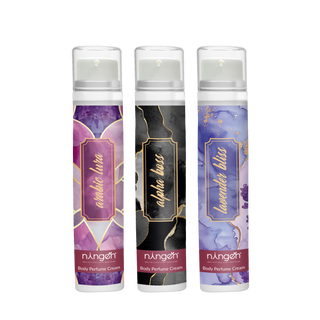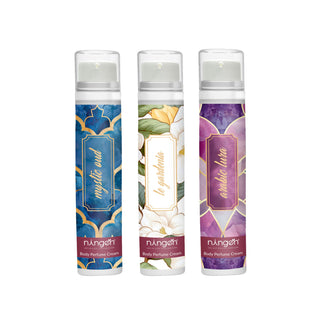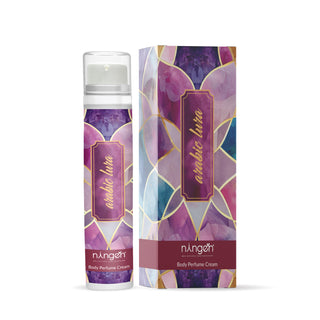क्या आपने कभी ऐसे कमरे में एंटर किया है, जहाँ एक स्ट्रांग सेंट की वजह से आपको तुरंत हेडेक या नॉजिया महसूस हुआ हो? अगर हां, तो हो सकता है आप भी उन लोगों में से हों , जिन्हें परफ्यूम एलर्जी हो। यह एक नार्मल लेकिन अक्सर अनदेखी जाने वाली स्थिति है, जो कई लोगों की डेली लाइफ को गंभीर रूप से प्रभावित कर सकती है। परफ्यूम एलर्जी तब होती है। जब आपका शरीर फ्रेगरेंस में पाए जाने वाले कुछ केमिकल्स के लिए रिएक्शन दिखाता है, जो ब्यूटी प्रोडक्ट्स, क्लीनिंग सप्लाइज, और यहां तक कि लॉन्ड्री डिटर्जेंट्स में भी होते हैं।
इस एलर्जी को समझना ज़रूरी है, क्योंकि आजकल की मॉडर्न दुनिया में आर्टिफिशियल सेंट्स काफी आम हैं और ये अनचाहे लक्षणों को ट्रिगर कर सकते हैं, इस आर्टिकल में, हम परफ्यूम एलर्जी के लक्षणों और कारणों को डिटेल में समझेंगे, प्रभावी इलाजों पर चर्चा करेंगे, और फ्रेगरेंस-फ्री प्रोडक्ट्स ढूंढने में आपकी मदद करेंगे।
In This Article;
- परफ्यूम एलर्जी: क्या है
- परफ्यूम एलर्जी कितने लोगों को होती है?
- परफ्यूम एलर्जी के कारण:
- सामान्य परफ्यूम एलर्जी के कारण ( pls put this in a box )
- परफ्यूम एलर्जी के लक्षण क्या होते हैं?
- परफ्यूम एलर्जी वाले लोग कैसे सही फ्रेगेंस प्रोडक्ट्स ढूंढ सकते हैं?
- इन तरीकों से परफ्यूम एलर्जी वाले लोग अपने लिए सुरक्षित और आरामदायक प्रोडक्ट्स चुन सकते हैं।
- मुख्य बातें:
- क्विक व्यू
- अक्सर पूछे जाने वाले सवाल
परफ्यूम एलर्जी: क्या है
परफ्यूम एलर्जी, जिसे फ्रेगेंस सेंसिटिविटी भी कहते हैं, एक तरह की स्किन एलर्जी है। यह तब होती है जब शरीर के इम्यून सिस्टम को परफ्यूम्स में मौजूद कुछ केमिकल्स से एलर्जी हो जाती है। ये केमिकल्स सिंथेटिक (कृत्रिम) या नेचुरल (प्राकृतिक) हो सकते हैं। जब इनका संपर्क स्किन से होता है, या इन्हें सूंघा जाता है, तो एलर्जी के लक्षण दिख सकते हैं।
परफ्यूम एलर्जी एक प्रकार की प्रतिक्रिया होती है, जो परफ्यूम्स, कोलोन, और दूसरे सेंटेड प्रोडक्ट्स के केमिकल्स के कारण होती है। इसमें एसेंशियल ऑयल्स या सिंथेटिक फ्रेगेंस भी शामिल हो सकते हैं।
जब एलर्जी वाला व्यक्ति परफ्यूम या कोई सेंटेड प्रोडक्ट इस्तेमाल करता है, तो शरीर उसे हानिकारक समझता है और इससे बचने के लिए एंटीबॉडीज़ और हिस्टामिन्स रिलीज़ करता है, जिससे स्किन पर जलन, नाक में परेशानी या सांस लेने में दिक्कत हो सकती है।
परफ्यूम एलर्जी के मुख्य बिंदु:
- कारण: शरीर का इम्यून सिस्टम परफ्यूम्स में मौजूद केमिकल्स को हानिकारक समझता है।
- लक्षण: स्किन रैश, हल्का जुकाम, और सांस से संबंधित समस्या।
- डायग्नोसिस: पैच टेस्ट और ब्लड टेस्ट।
- मैनेजमेंट: एलर्जी ट्रिगर करने वाले सेंट्स से बचना और इलाज करवाना।
परफ्यूम एलर्जी हर किसी के लिए अलग हो सकती है, क्योंकि हर व्यक्ति के शरीर का रिस्पांस अलग होता है। कभी-कभी, एक ही प्रोडक्ट में कई केमिकल्स होते हैं, जिनसे कुछ लोगों को एलर्जी हो सकती है।
परफ्यूम एलर्जी कितने लोगों को होती है?
परफ्यूम एलर्जी एक आम समस्या है। स्टडीज़ के अनुसार, लगभग 30% लोग किसी न किसी रूप में फ्रेगेंस सेंसिटिविटी का अनुभव करते हैं, और 1-4% लोगों को परफ्यूम एलर्जी के लक्षण दिखते हैं। यह किसी भी उम्र या जेंडर के व्यक्ति को हो सकती है।
कुछ ग्रुप्स, जैसे अस्थमा या एक्जिमा वाले लोग, इनमें परफ्यूम एलर्जी होने का खतरा अधिक होता है। रोज़मर्रा के परफ्यूम्स, एयर फ्रेशनर्स और फैब्रिक सॉफ़नर्स के कारण यह समस्या और बढ़ सकती है। यह एक पब्लिक हेल्थ कंसर्न बन गई है।
परफ्यूम एलर्जी के कारण:
- फ्रेगेंस केमिकल्स:
बहुत सारे परफ्यूम्स में सिंथेटिक केमिकल्स होते हैं, जो एलर्जी का कारण बन सकते हैं। यह खासकर सेंसिटिव लोगों को प्रभावित करता है।
- नेचुरल एलर्जेंस:
कुछ प्राकृतिक पदार्थ, जैसे सिट्रस फल (limonene) और लैवेंडर (linalool), परफ्यूम्स में होते हैं और इनसे एलर्जी हो सकती है।
- बेंजिल अल्कोहल:
परफ्यूम्स में अल्कोहल सॉल्वेंट के रूप में इस्तेमाल होता है, जो स्किन को ड्राई और इरिटेट कर सकता है।
- मल्टीपल सेंट्स से एक्सपोज़र:
एक साथ कई सेंटेड प्रोडक्ट्स का इस्तेमाल करने से इम्यून सिस्टम पर दबाव पड़ता है, जिससे एलर्जी हो सकती है।
- मौजूदा स्वास्थ्य स्थितियां:
अगर किसी को अस्थमा, एक्जिमा, या एलर्जिक राइनाइटिस जैसी समस्याएं हैं, तो उन्हें परफ्यूम एलर्जी का खतरा ज्यादा हो सकता है।
परफ्यूम एलर्जी के कारणों को समझना बहुत जरूरी है ताकि इससे बचा जा सके या इसके लक्षणों को मैनेज किया जा सके।
सामान्य परफ्यूम एलर्जी के कारण
- केमिकल कंपाउंड्स का उपयोग
- सिंथेटिक पदार्थ जो परफ्यूम्स में होते हैं, जो इम्यून प्रतिक्रिया को ट्रिगर कर सकते हैं।
- प्राकृतिक एलर्जेंस
- एसेंशियल ऑयल्स में पाए जाने वाले प्राकृतिक कंपाउंड्स के प्रति एलर्जी प्रतिक्रिया।
- एल्कोहल कंटेंट
- परफ्यूम्स में सॉल्वेंट के रूप में इस्तेमाल होने वाला अल्कोहल, जो स्किन को इरिटेट और ड्राई कर सकता है।
- मल्टीपल सेंट एक्सपोज़र
- विभिन्न प्रकार के फ्रेगेंस से इम्यून सिस्टम पर अत्यधिक दबाव, जिससे एलर्जी हो सकती है।
- मौजूदा स्वास्थ्य स्थितियां
- श्वसन या इम्यून संवेदनाओं वाले व्यक्तियों के लिए बढ़ा हुआ जोखिम।
परफ्यूम एलर्जी के लक्षण क्या होते हैं?
परफ्यूम एलर्जी, जो एक प्रकार की फ्रेगेंस सेंसिटिविटी है, कई तरह के लक्षण पैदा कर सकती है, जो त्वचा, सांस लेने की समस्या और शरीर के दूसरे हिस्सों को प्रभावित करते हैं। जब किसी व्यक्ति को सेंटेड प्रोडक्ट्स का संपर्क होता है, तो उसे अलग-अलग प्रतिक्रियाएं हो सकती हैं। यहां 5 आम लक्षण दिए गए हैं:
- त्वचा पर जलन:
परफ्यूम एलर्जी का सबसे आम लक्षण है त्वचा पर जलन, जिसमें रेडनेस , खुजली, सूजन या हाइव्स (फफोले) हो सकते हैं। इसे एलर्जिक कॉन्टैक्ट डर्मेटाइटिस कहते हैं।
- सांस से जुड़ी समस्याएं:
परफ्यूम से सांस लेने में दिक्कत हो सकती है, जैसे छींकना, खांसी, नाक से पानी आना, या सांस लेने में परेशानी होना। कुछ मामलों में यह एलर्जिक राइनाइटिस की तरह महसूस हो सकता है।
- सिर दर्द:
परफ्यूम का संपर्क सिरदर्द या माइग्रेन का कारण बन सकता है, जिससे दिन-प्रतिदिन की जिंदगी में परेशानी हो सकती है।
- एक्जिमा का बढ़ना:
अगर किसी को पहले से एक्जिमा की समस्या है, तो परफ्यूम का संपर्क उस पर असर डाल सकता है, जिससे लक्षण और बढ़ सकते हैं और बार-बार फ्लेयर-अप्स हो सकते हैं।
- अस्थमा के हमले:
परफ्यूम अस्थमा वाले लोगों में अस्थमा के हमले को भी बढ़ा सकता है, जिसमें सांस लेते वक्त आवाज़ आना, छाती में कसाव और सांस लेने में कठिनाई होती है।
ये लक्षण उन्हीं लोगों में होते हैं, जो परफ्यूम एलर्जी से प्रभावित होते हैं। इन लक्षणों को पहचानकर, उनसे बचाव करना जरूरी है।
|
लक्षण |
विवरण |
|
त्वचा पर जलन |
इसमें लालपन, खुजली, सूजन, हाइव्स शामिल हैं; यह एलर्जिक कॉन्टैक्ट डर्मेटाइटिस के संकेत होते हैं। |
|
श्वसन लक्षण |
छींकना, खांसी, नाक से पानी आना, सांस लेने में कठिनाई; अक्सर एलर्जिक राइनाइटिस जैसा महसूस होता है। |
|
सिरदर्द |
परफ्यूम के संपर्क से सिरदर्द या माइग्रेन का होना। |
|
एक्जिमा का बढ़ना |
एक्जिमा के लक्षणों का तेज होना, जिससे त्वचा की समस्या और बढ़ सकती है। |
|
अस्थमा के हमले |
परफ्यूम के संपर्क से अस्थमा के लक्षण जैसे व्हीजिंग, छाती में कसाव, और सांस लेने में दिक्कत। |
अगर आपको ये लक्षण महसूस हों, तो डॉक्टर से सलाह लेना जरूरी है। बिना इलाज के यह समस्याएँ बढ़ सकती हैं, जैसे सांस लेने में परेशानी, खुजली वाली जगह पर संक्रमण और पहले से मौजूद बीमारियाँ जैसे अस्थमा या एक्जिमा का बिगड़ना। इसके अलावा, परफ्यूम की एलर्जी का इलाज न होने पर तनाव और चिंता भी बढ़ सकती है, क्योंकि आपको कुछ जगहों या चीजों से बचना पड़ता है, जो आपके रोज़मर्रा के जीवन को प्रभावित कर सकता है।
परफ्यूम एलर्जी का इलाज करने के लिए सबसे प्रभावी तरीका
हालांकि, जब संपर्क से बचना मुमकिन न हो या लक्षणों से राहत पाने की जरूरत हो, तो कुछ उपाय दिए गए हैं:
- टॉपिकल कॉर्टिकोस्टेरॉयड : यह एलर्जी संपर्क डर्मेटाइटिस में सूजन कम करने में मदद कर सकते हैं।
- एंटीहिस्टामिन : ओरल एंटीहिस्टामिन नाक बहने या खुजली जैसे लक्षणों से राहत दे सकते हैं, जो एलर्जिक राइनाइटिस के कारण होते हैं।
- डीकंजेस्टेंट: नाक की बंदी से तात्कालिक राहत के लिए इनका उपयोग किया जा सकता है।
- इम्यूनोथेरेपी : पुराने मामलों में, डॉक्टर एलर्जन इम्यूनोथेरेपी की सलाह दे सकते हैं।
- पैच टेस्टिंग : विशिष्ट एलर्जन्स की पहचान करने और उनसे बचने में मदद करने के लिए।
- ठंडे सेक : त्वचा पर जलन और खुजली को शांत करने के लिए।
- इमोलिएंट्स : त्वचा की देखभाल करने और एलर्जी प्रतिक्रिया के बाद खुशबू से मुक्त रहने के लिए।
- चिकित्सकीय सलाह: अगर सांस लेने में कठिनाई जैसे जानलेवा लक्षण महसूस हों, तो तुरंत डॉक्टर से संपर्क करें।
|
उपचार के तरीके |
क्या काम करता है |
|
बचाव (Avoidance) |
लक्षणों से बचने का सबसे आसान तरीका है कि इन चीज़ों से दूर रहें जो एलर्जी का कारण बनती हैं। |
|
टॉपिकल कॉर्टिकोस्टेरॉयड (Topical Corticosteroids) |
यह दवाइयाँ त्वचा की सूजन और रैश को कम करती हैं। |
|
एंटीहिस्टामिन्स (Antihistamines) |
यह दवाइयाँ नाक से पानी आने, छींकने और खुजली को कम करती हैं। |
|
डिकंजेस्टेंट्स (Decongestants) |
यह नाक के जाम को थोड़ा आराम देती हैं, जिससे सांस लेने में आसानी होती है। |
|
इम्यूनोथेरेपी (Immunotherapy) |
यह इलाज शरीर की एलर्जी की सेंसिटिविटी को ठीक करने का काम करता है। |
|
पैच टेस्ट (Patch Tests) |
यह टेस्ट यह पता करने में मदद करता है कि कौन सा फ्रेगेंस एलर्जी का कारण बन रहा है। |
|
ठंडी सिकाई (Cool Compresses) |
यह ठंडी सिकाई त्वचा की जलन और इरिटेशन को शांत करती है। |
|
इमोलिएंट्स (Emollients) |
यह क्रीम या लोशन त्वचा को नम और सुरक्षित रखता है। |
|
तत्काल चिकित्सा सहायता (Immediate Medical Attention) |
अगर एलर्जी का असर बहुत गंभीर हो, तो तुरंत डॉक्टर से संपर्क करें। |
परफ्यूम एलर्जी वाले लोग कैसे सही फ्रेगेंस प्रोडक्ट्स ढूंढ सकते हैं?
जो लोग परफ्यूम एलर्जी से परेशान हैं, उनके लिए यह ज़रूरी है कि वे ऐसे प्रोडक्ट्स का चुनाव करें जो एलर्जी का कारण न बनें।
यहां कुछ तरीके दिए गए हैं, जिनसे वे सही प्रोडक्ट्स ढूंढ सकते हैं:
- हाइपोएलर्जेनिक लेबल देखें:
ऐसे प्रोडक्ट्स चुनें जो 'हाइपोएलर्जेनिक' (कम एलर्जी पैदा करने वाले) के रूप में लेबल किए गए हों, यानी इनसे एलर्जी की प्रतिक्रिया का जोखिम कम होता है।
- सामग्री ध्यान से पढ़ें :
उन प्रोडक्ट्स से बचें जिनकी सामग्री में 'परफ्यूम' या 'फ्रैग्रेंस' लिखा हो, क्योंकि यह सामान्य शब्द होते हैं जो एलर्जी पैदा करने वाले कम्पाउंड्स को छिपा सकते हैं।
- पैच टेस्ट करें:
परफ्यूम को पूरी तरह से इस्तेमाल करने से पहले, इसे अपनी त्वचा पर छोटे से हिस्से पर लगाकर 24-48 घंटे तक टेस्ट करें ताकि किसी प्रकार की एलर्जी प्रतिक्रिया का पता चल सके।
- फ्रेगेंस-फ्री ऑप्शंस चुनें:
ऐसे प्रोडक्ट्स चुनें जिनपर 'फ्रेगेंस-फ्री' लिखा हो, न कि 'अनसेंटेड'। 'अनसेंटेड' में अक्सर मास्किंग फ्रेगेंस होते हैं, जो एलर्जी पैदा कर सकते हैं।
- स्वास्थ्य विशेषज्ञ से सलाह लें:
अपने डॉक्टर या एलर्जिस्ट से सलाह लें जो आपकी एलर्जी की संवेदनशीलता के आधार पर सही प्रोडक्ट्स की सिफारिश कर सकते हैं।
- परफ्यूम क्रीम्स:
परफ्यूम क्रीम्स का इस्तेमाल करें, क्योंकि इनमें कम जोखिम होता है त्वचा की जलन या सांस की समस्याएं पैदा करने का। लेकिन यह ध्यान रखें कि इनमें भी सामान्य एलर्जेंस न हों।
इन तरीकों से परफ्यूम एलर्जी वाले लोग अपने लिए सुरक्षित और आरामदायक प्रोडक्ट्स चुन सकते हैं।
|
प्रोडक्ट का प्रकार |
क्या चुनें |
|
सेंटेड आइटम्स (General Fragranced Items) |
'फ्रेगेंस-फ्री' प्रोडक्ट चुनें |
|
डिटर्जेंट्स और सॉफ़नर्स (Detergents & Softeners) |
'हाइपोएलर्जेनिक' प्रोडक्ट चुनें |
|
पर्सनल केयर प्रोडक्ट्स (Personal Care Products) |
'फ्रेगेंस-फ्री' क्रीम और लोशन चुनें |
मुख्य बातें:
परफ्यूम एलर्जी से जीवन की गुणवत्ता पर असर पड़ सकता है, जैसे त्वचा की जलन या सांस लेने में परेशानी। यह समस्या हर व्यक्ति में अलग-अलग हो सकती है, और इसका सही तरीके से इलाज बहुत जरूरी है। अगर आपको सांस लेने में दिक्कत या बैक्टीरियल इन्फेक्शन के संकेत दिखें, तो तुरंत डॉक्टर से संपर्क करें।
डॉक्टर एलर्जी के कारण पता लगाने के लिए पैच टेस्ट और ब्लड टेस्ट कर सकते हैं। जब आप परफ्यूम एलर्जी के बारे में जानते हैं, तो आप अपनी ज़िंदगी को इससे बचने के लिए बदल सकते हैं और सही इलाज ले सकते हैं।
सही इलाज और ट्रिगर्स से बचने से परफ्यूम एलर्जी से प्रभावित लोग अपनी जिंदगी आराम से जी सकते हैं।
क्विक व्यू
परफ्यूम एलर्जी त्वचा और सांस संबंधी समस्याएं पैदा करती है। इसके लक्षणों में रैशेस, सिरदर्द और सांस में परेशानी शामिल हैं। इनसे बचने के लिए, फ्रेगेंस-फ्री और हाइपोएलर्जेनिक प्रोडक्ट्स का चुनाव करें। डॉक्टर से सलाह लेना और सही इलाज करवाना ज़रूरी है। इससे आप एलर्जी कम कर सकते हैं और आराम से जी सकते हैं।
अक्सर पूछे जाने वाले सवाल
- परफ्यूम एलर्जी क्या है?
परफ्यूम एलर्जी तब होती है जब शरीर को फ्रेगेंस के घटक पसंद नहीं आते और त्वचा या सांस संबंधी समस्याएं पैदा हो जाती हैं। यह धीरे-धीरे बढ़ सकता है, खासकर बार-बार एलर्जेन्स से संपर्क करने पर।
- परफ्यूम एलर्जी के सामान्य लक्षण क्या होते हैं?
परफ्यूम एलर्जी के लक्षणों में शामिल हैं:
- त्वचा पर रिएक्शन : रैशेस, खुजली या हाइव्स (फफोले)।
- सांस संबंधी लक्षण: छींकना, खांसी, नाक से पानी आना।
- सिरदर्द : कुछ लोगों को परफ्यूम से सिरदर्द या माइग्रेन हो सकता है।
- कैसे पता लगाएं कि मुझे परफ्यूम एलर्जी है?
अगर आपको परफ्यूम से एलर्जी का शक है, तो डॉक्टर से सलाह लें। डॉक्टर पैच टेस्ट और ब्लड टेस्ट कर सकते हैं, जिससे पता चलेगा कि कौन सा घटक आपकी एलर्जी को बढ़ाता है।
- परफ्यूम एलर्जी का इलाज कैसे किया जा सकता है?
परफ्यूम एलर्जी के इलाज के तरीके:
- एलर्जी से बचने के लिए कोशिश करें।
- 'फ्रेगेंस-फ्री' या 'हाइपोएलर्जेनिक' प्रोडक्ट्स का इस्तेमाल करें।
- डॉक्टर की सलाह से दवाइयां लें, जैसे एंटीहिस्टामिन्स या क्रीम, ताकि लक्षण कम हों।
- क्या मैं फिर भी परफ्यूम का इस्तेमाल कर सकता हूं?
अगर आपको परफ्यूम एलर्जी है, तो सामान्य परफ्यूम से बचना चाहिए। हालांकि, आप 'फ्रेगेंस-फ्री' या 'अनसेंटेड' प्रोडक्ट्स इस्तेमाल कर सकते हैं। कुछ प्राकृतिक विकल्प भी हैं, लेकिन यह ध्यान रखें कि इनमें भी एलर्जी हो सकती है।
- सही प्रोडक्ट्स कैसे ढूंढें?
जब आप कोई प्रोडक्ट खरीदें, तो 'फ्रेगेंस-फ्री' या 'हाइपोएलर्जेनिक' वाले प्रोडक्ट्स चुनें। सामग्री के लेबल को ध्यान से पढ़ें ताकि आपको एलर्जेन्स का पता चले। और अगर जरूरी हो तो डॉक्टर से सलाह लेकर अपनी एलर्जी के हिसाब से सही प्रोडक्ट चुनें।











